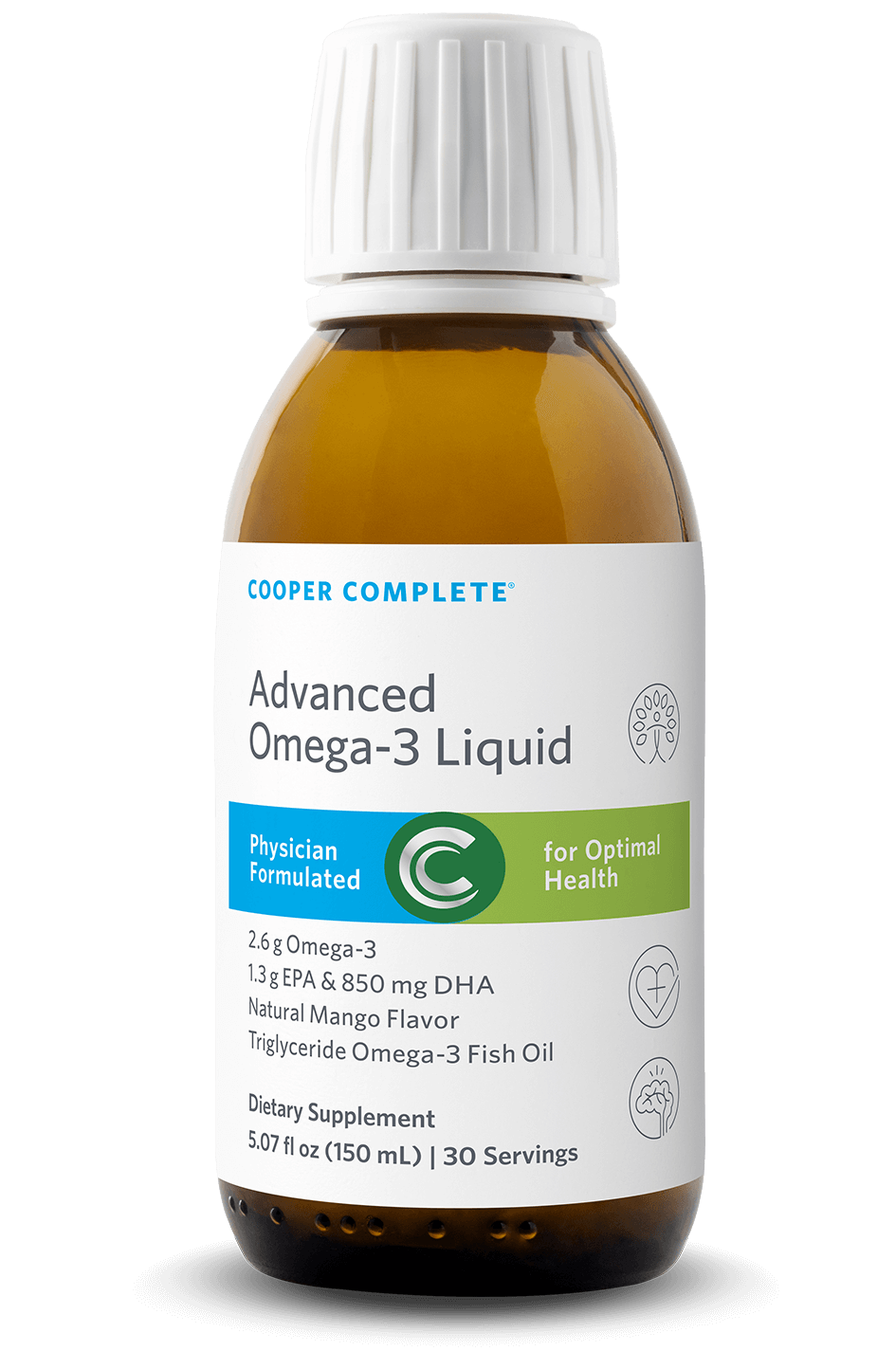Omega-3 Health Benefits Throughout The Body

Omega-3s are one of the most well-researched nutrients on the market, with more than 30,000 published studies exploring its various benefits. Most widely known to provide heart health benefits, research shows omega-3 fatty acids support good health in a wide variety of ways, including brain, eye, sleep, skin and gut health, as well as effectiveness at reducing inflammation, depression, anxiety and the risk of certain types of cancer.†
Both the American Heart Association and American Psychiatric Association recommend eating fish, particularly fatty fish—such as salmon, mackerel or albacore tuna—a minimum of two servings per week. However, Michael Chapman, MD, Cooper Clinic Platinum Physician, says many of his patients don’t get enough omega-3 in their diets. “Optimal levels of omega-3 would be 7 to 8 percent and above,” says Dr. Chapman. “Most people who don’t take omega-3 supplements or don’t have an omega-3 rich diet find themselves around 2 to 4 percent.”
Heart Health
Perhaps the most well-known of omega-3’s benefits is on heart health. Diets rich in the omega-3 fatty acids EPA and DHA—as found in oily fish such as salmon, cod, sardines and canned light tuna—or taking omega-3 supplements can support heart health by reducing blood pressure, as indicated by a review of clinical research.
Persons with elevated levels of triglycerides may also benefit from omega-3 supplementation. Triglycerides are a type of fat (lipid) found in the blood and elevated levels are considered a risk factor for cardiovascular disease. “The data on omega-3 as it relates to decreasing triglycerides is very strong,” says John S. Ho, MD, Cooper Clinic Cardiologist. “I take Cooper Complete Advanced Omega-3 because I have high triglycerides myself. Containing 1400 mg of EPA and DHA and other omega-3 fatty acids in each two-softgel serving, “Cooper Complete Advanced Omega-3 has among the highest levels of EPA and DHA,” explains Ho. “That’s why I recommend it to my patients.”
One of the most significant ongoing studies in recent years, the VITAL study continues to follow 25,871 adults aged 50+ as they supplement 50 mcg (2000 IU) vitamin D and 1 gram of fish oil per day. Nina B. Radford, MD, Cooper Clinic Cardiologist, shares her takeaways from the VITAL study, including the following highlights:
- People who consumed less than the two servings of fatty fish each week but took the 1 gram omega-3 supplement experienced:
- 19 percent reduced chance of any of one of three cardiovascular events
- 22 percent reduced risk for an angioplasty procedure
- 28 percent decreased risk of heart attack
- There were fewer fatal and non-fatal heart attacks and need for stents or bypasses in the group taking omega-3. (There was no reduction in stroke risk or overall risk of death.)
- The cardioprotective benefits of omega-3 use demonstrated in this study are consistent with basic science research showing omega-3 fatty acids:
- Lower blood pressure
- Reduce the risk of blood clots and vascular inflammation
- Inhibit the growth of atherosclerotic plaque (hardening of the arteries)
- Reduce the tendency to develop abnormal heart rhythms
- Promote blood vessel relaxation
One fact cannot be emphasized enough, according to Dr. Radford: “…if you do not eat one or two servings of fish per week (and most people don’t), you can reduce your risk of heart attack, stroke or death from cardiovascular causes by almost 20 percent simply by taking 1 gram of fish oil every day.” A daily serving of Cooper Complete Advanced Omega-3 contains 1.4 grams of omega-3 fatty acids.
Brain Health
Omega-3 is the basic building block for neurons in the brain. According to Steve Farrell, PhD, FACSM, The Cooper Institute Senior Investigator, “There is a high concentration of omega-3 in the brain, which can help different regions of the brain communicate with each other. So, a low omega-3 level can have an adverse effect on brain health.”
Studies have shown omega-3’s benefits in reducing the risk of cognitive decline and treating migraine headaches and ADHD in children.
- In a six-month randomized controlled trial investigating omega-3 health benefits from supplementation on object-location memory, a group receiving 2.2 grams of omega-3 for six months scored significantly better in post-trial memory tests compared to participants who received the placebo.
- Researchers at the University of North Carolina Chapel Hill found a high omega-3 diet reduced the frequency of migraines by two headache days per month compared to the control group. A second group with a diet high in omega-3 and reduced omega-6 (n-6 linoleic acid, commonly found in plant oils) saw a reduction of 4 headache days per month. Participants in both groups reported shorter and less severe headaches than those in the control group.
- A review of 10 randomized trials involving children with ADHD found those who took omega-3 exhibited modest improvement in hyperactivity and inattentiveness.
Eye Health
Age-related macular degeneration (AMD) is the leading cause of blindness in older Americans. While a clear link between the consumption of fish and the risk of AMD has not been established, research shows a diet rich in omega-3 can help reduce the odds of advanced cases of AMD. Research subjects with advanced AMD were significantly less likely to include adequate levels of fatty fish in their diets. On average, participants who ate one or more servings of fatty fish each week were 60 percent less likely to have advanced AMD than those who ate fewer than one serving each week.
Fish oil has also been found to help provide relief to adults suffering from dry eye—either associated with computer use or from wearing contact lenses. A study of young adults found a daily serving of fish oil—each providing 180 mg EPA and 120 mg DHA—for three months improved symptoms while decreasing the rate of tear evaporation. Additionally, an Australian study of adults experiencing dry eye discomfort from the use of soft disposable contact lenses found fish oil capsules (900 mg EPA; 600 mg DHA) significantly reduced self-reported dry eye symptoms.
Sleep Health
The rate of natural melatonin formation in the body depends on the activity of specific enzymes represented mostly in the pineal gland. The rhythm of enzyme activity—and synthesis of melatonin—may be altered by the level of omega-3 in the body. In a study published by the National Library of Medicine (NIH) involving rodents as research subjects, an omega-3 deficient diet reduces nighttime melatonin secretion, which returns to normal with supplemented DHA. Cooper Complete Advanced Omega-3 contains 480 mg of DHA in every two-softgel daily serving.
In a subsequent study published by the NIH, fatty fish consumption was shown to improve biological functions involved in self-regulation, such as heart rate variability (HRV), suggesting omega-3 levels may also influence the quality of sleep and daily functioning. It also appears sufficient levels of vitamin D and high HRV may have a positive relationship to these beneficial effects.

Advanced Omega-3 Liquid Supplement
Naturally flavored mango Advanced Omega 3 Liquid supplement is a molecularly distilled, high-concentration fish oil that contains 1300 mg (1.3 g) EPA, 850 mg DHA, and 175 mg DPA (Docosapentaenoic Acid) omega-3 fatty acids in each teaspoon (5 mL) serving. Omega 3 supplementation supports heart health, cognition, immune and inflammatory health.†
$52.48 Add to cartSkin Health
Men and women with mild to moderate acne can experience a significant reduction in the number and severity of acne lesions by supplementing their diets with omega-3 fatty acids.† After taking daily servings of omega-3 containing 1,000 mg each of EPA and DHA, participants in this small study saw:
- 6 percent reduction in inflammatory acne lesions
- 6 percent reduction in non-inflammatory lesions
- 29 percent reduction in lesion severity
Gut Health
According to a study published in the National Library of Medicine (NIH), omega-3 polyunsaturated fatty acids (PUFAs) are actually considered prebiotics. While much research is still needed to fully understand the relationship between omega-3 PUFAs and gut microbiota—the collection of microorganisms in each person’s gastrointestinal system—this study has shown omega-3 PUFAs exert significant effects on the intestines and can provide health benefits to individuals suffering from intestinal bowel disease (IBD).
Growing evidence from animal model studies indicates the interplay between gut microbiota, omega-3 fatty acids and immunity helps maintain intestinal wall integrity and interacts with host immune cells. Omega-3 can exert a positive action by reverting the microbiota composition in diseases such as irritable bowel syndrome (IBS) and increasing the production of anti-inflammatory compounds, like short-chain fatty acids.
The same NIH study identified common changes in the gut microbiota associated with the consumption of omega-3 supplements. Results were highlighted by a decrease in the microorganism, faecalibacterium, and an associated increase in bacteroidetes and butyrate-producing bacteria from the Lachnospiraceae family. Butyrate is among the most abundant short-chain fatty acids (SFCA) in the gut and is shown to improve the symptoms of IBD. Omega-3 reverts the patient’s microbiota to a healthier composition, triggering a healthy chain reaction and increasing SCFA amounts, with their anti-inflammatory action improving this pathology.
Inflammatory Health
According to Kenneth H. Cooper, MD, MPH, a pioneer in preventive medicine, Chairman and Founder of Cooper Aerobics, “Chronic inflammation is the root cause of the process of the onset of chronic disease. But, if interfered with by an anti-inflammatory such as omega-3, one can reverse this pathology.”
Cooper Clinic President and CEO Camron Nelson, MD, adds that omega-3 health benefits are highlighted by its “anti-inflammatory effect … in the arteries. Because the body cannot manufacture omega-3 fatty acids, it’s important to consume them through diet and supplements.” A study published in American Heart Association’s Circulation Research journal found fish oil supplements reduced inflammation by increasing the concentration of “mediators” that regulate the work of specific components in the blood.
The long-chain omega-3 fatty acids associated with its anti-inflammatory benefits—EPA and DHA—have been tested and studied for the treatment of symptoms of specific autoimmune diseases, including:
- A Swedish study found consistent, long-term intake of omega-3 was associated with a 52 percent lower risk of developing rheumatoid arthritis.
- A European study showed people with the highest consumption of DHA had a 77 percent reduced risk of developing ulcerative colitis.
Depression and Anxiety Management
Omega-3 health benefits also include positive effects on brain health in various psychiatric disorders, including depression as well as schizophrenia and bipolar disorder.† Researchers studying the impact of cultural characteristics on health issues have found populations that consume higher levels of fatty fish such as salmon—and therefore more omega-3—have lower overall levels of depression. Furthermore, through its specific fatty acid EPA, omega-3 health benefits were found to be highly significant when added to ongoing antidepressant therapy.
Omega-3 deficiency, especially during intrauterine and early life, is also associated with impaired psychomotor development and attention, cognition and visual acuity issues. In addition, a substantial decrease in brain omega-3 levels—DHA in particular—was found in patients with autism spectrum disorder, correlating with mood and behavioral disorders such as anxiety and depression later in life.
Cancer Prevention
While not all studies on omega-3 health benefits show significant effects on the risk of most cancers, analysis of data from the VITAL study found supplementation significantly reduced the risk of precancerous colorectal growths, precursors to colorectal cancer. Additionally, individuals diagnosed with colorectal cancer who consume 300 mg or more of omega-3 each day have a 41 percent lower risk of dying from the disease than those consuming less than 100 mg/day.
Studies show consuming higher levels of EPA and DHA from fish is also associated with a 25 percent lower risk of recurrence and a 25-34 percent lower risk of death from breast cancer. A third study concluded that among postmenopausal women, current use of fish oil supplements was associated with a 32 percent reduction in the risk of breast cancer. Clinicians in this study point out that more research is needed to replicate results in order to draw conclusions about omega-3’s effect on reducing breast cancer risk.
One serving of Cooper Complete Advanced Omega-3 softgels provides 1,400 mg combined of 720 mg Eicosatetraenoic Acid (EPA) and 480 mg Docosahexaenoic Acid (DHA) (plus 200 mg additional omega-3 fatty acids), the daily dosage recommended by Cooper Clinic physicians.
Your physician understands your current health profile best. Before adding any new nutritional supplement to your diet, consult your physician.

